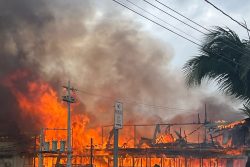By Dr Bertrand Ramcharan
Seventh Chancellor of the University of Guyana Former United Nations Under-Secretary-General
On 22 and 23 September, Guyana’s senior leadership, which one expects will be headed by His Excellency President Irfaan Ali, will participate at the United Nations in a Summit for the Future and will, in all likelihood, join in adopting a Pact for the Future, which has been under negotiation over the past months. The second revised text of the Pact, has been publicly available since 17 July, 2024. Guyana’s Permanent Mission to the UN and its Ministry of Foreign Affairs will have participated in the negotiating process.
Given the complex history and population structure of Guyana, it has long been the view of this author that two sets of ideas could help knit and take the country forward: the universal human rights norms recognized by the United Nations, and policy recommendations adopted by the UN after broad-based consultation with its membership. It is in this spirit that we have sought to contribute to structural aspects of the public policy debate in Guyana.
There are some valuable ideas in the forthcoming Pact for the Future that could serve Guyana well, if taken and followed up in good faith. Three of these are of particular relevance: (i) Striving for peaceful, just, and inclusive societies on the basis of respect for human rights; (ii) Building peace at the national level; and (iii) Striving for equitable development and the reduction of poverty. Before setting out the Pact’s provisions on this set of issues, we provide next a snapshot of its broad strategies.
On issues affecting human survival, the Pact promises to protect everyone on earth through universal coverage of early warning systems. One may ask whether we have such early-warning systems in Guyana and whether we plan to develop them?
On new threats and challenges to humanity, the Pact requests the Secretary-General to develop, in consultation with Member States, protocols “for convening and operationalizing emergency platforms based on flexible approaches to respond to a range of different complex global shocks,” How will Guyana play its part in this? This is something that the President’s National Security Adviser could reflect on.
The Pact promises to address, manage and promote the prevention of water scarcity and to build resilience to drought so as to achieve a world in which water is a sustainable resource, and to ensure the availability and sustainable management of clean and safe water, hygiene and sanitation for all. How will Guyana pursue water security and management strategies?
On issues of governance, the Pact lays stress on the rule of law nationally and internationally, and promises to act for the strengthening of international law.
On development, the Pact reaffirms the Sustainable Development Goals (SDGs) and calls for additional financing for development. Eradicating poverty, in all its forms and dimensions, including extreme poverty, is declared an imperative for all humankind.
On the protection of human rights the Pact reaffirms the Universal Declaration of Human Rights and declares: “… we will be unequivocal in what we stand for and uphold: freedom from fear and freedom from want for all without discrimination. “ How will Guyana go about this?
On issues of peace and security, the Pact calls on Member States to build and sustain peace at the national level. It promises to address the serious impact of a range of threats to international peace and security, including threats to maritime security and safety.
The Pact requests the UN Secretary-General to update Member States on new and emerging technologies, including nanotechnology and human enhancement technology and their implications for international peace and security.
Having provided an overview of the broad strategies of the forthcoming Pact for the Future, we zero in next on the contents of the Pact on the three issues that Guyana could pay particular attention to.
Striving for peaceful, just and inclusive societies on the basis of respect for human rights
Inspired by SDG 16, Action 7 of the Pact pledges: “We will strengthen our efforts to build peaceful, just and inclusive societies that provide equal access to }
justice for all and uphold human rights and fundamental freedoms.” The Pact recognizes that the Sustainable Develop-ment Goals seek to achieve all human rights, and that securing peace, upholding the rule of law and respecting promoting, protecting and fulfilling all human rights are essential to achieving sustainable development which leaves no one behind. The Pact therefore decides to:
Respect, protect and fulfil all human rights and fundamental freedoms, including the right to development, promote effective rule of law and good governance at all levels and build transparent, inclusive, effective and accountable institutions.
Ensure that all human rights are at the centre of our efforts to eradicate poverty, combat inequalities, leave no one behind and implement the 2030 Agenda.
Action 13 of the Pact pledges: “We will redouble our efforts to build and sustain peaceful, inclusive and just societies and address the root causes of conflicts. “ It continues: We recognize the interdependence of international peace and security, sustainable development and human rights and we reaffirm the importance of the rule of law. We decide to strengthen resilience and comprehensively address underlying drivers and root causes of armed conflict, violence, and insecurity; provide equal access to justice, protect civic space and uphold human rights for all, including through promoting a culture of peace, tolerance and peaceful coexistence, eradicating religious discrimination, racism and xenophobia and by enhancing human security.
Building peace at the national level
Action 18 of the Pact pledges: “We will build and sustain peace at the national level.” It continues: We recognize that Member States bear the primary responsibility for preventing conflict and building peace in their countries, and that national efforts to build and sustain peace contribute to the maintenance of international peace and security. We decide to:
Deliver on our commitment in the 2030 Agenda to significantly reduce all forms of violence and related death rates everywhere.
Redouble our efforts to eliminate sexual and gender-based violence and conflict-related sexual violence.
Eliminate racism, racial discrimination, xenophobia, religious intolerance and all other forms of intolerance and discrimination from our societies and promote interreligious and intercultural dialogue.
Strengthen and implement existing national prevention strategies and approaches, and develop them where they do not exist, on a voluntary basis, to address the root causes of violence and armed conflict.
Provide assistance to States, upon request, including through the Peace-building Commission and the entire United Nations system, to build national capacity to develop and implement their nationally-owned prevention strategies and approaches and address the root causes of violence and conflict in their countries.
Request the Secretary-General to provide Member States with examples and analysis of best practice and effective approaches from existing national, regional and sub-regional prevention mechanisms or strategies to be presented at the 80th session to facilitate lesson learning between Member States.
Address the risks associated with small arms and light weapons, their ammunition and parts and components, including through national prevention strategies and approaches.
Address the risks to the stability and cohesion of our societies posed by disinformation, misinformation, hate speech and content inciting harm, including content disseminated through digital platforms, while respecting the right to freedom of expression and privacy and ensuring unhindered access to the internet.
Pursue stronger alignment between the United Nations, international and regional financial institutions and the needs of Member States affected by conflict and violence to support their economic stability, national prevention and peacebuilding efforts.
Striving for equitable development and the reduction of poverty
Action 6 of the Pact promises to “invest in people to end poverty and strengthen trust and social cohesion.” The Pact expresses deep concern at persistent inequalities within and between countries and at the slow pace of progress towards improving the lives and livelihoods of people everywhere, including people in vulnerable situations. “We must meet the Sustainable Development Goals for all segments of society and leave no one behind, including through the localization of sustainable development. We decide to: Eradicate poverty and reduce inequalities by promoting universal health coverage, increasing access to quality, inclusive education and lifelong learning, including in emergencies, and improving opportunities for decent work for all. We pledge to:
Ensure access for all to adequate, safe and affordable housing and support developing countries to plan and implement just, safe, healthy, accessible, resilient and sustainable cities, and accelerate efforts to ensure access to affordable, reliable, and sustainable energy for all.
Maximize the positive contribution of migrants to the sustainable development of origin, destination and host countries and strengthen partnerships for safe, orderly and regular migration to comprehensively address the drivers of irregular migration and ensure the safety, dignity and human rights of all migrants.
Address, manage and promote the prevention of water scarcity and build resilience to drought to achieve a world in which water is a sustainable resource, and ensure the availability and sustainable management of clean and safe water, hygiene and sanitation for all. “
The provisions of the Pact for the Future in these three crucial areas could help greatly to provide a public policy framework for all parties in Guyana to rally around. In Guyana, there are very few public policy documents on which there is a national consensus, not even the Constitution. Could not the provisions of the Pact for the Future in these three crucial areas provide a policy consensus in Guyana? The Government of Guyana will have given its assent to this policy framework when it participates in the adoption of the Pact for the Future on 23 September.
The President could invite the main political parties to join in rallying around this consensus. Such an initiative would be an act of great statesmanship on the part of the President. And the leaders of the main political parties would join in such an act of statesmanship by rallying around the provisions of the Pact for the Future regarding the establishment of a peaceful, just, and inclusive society; the pursuit of national peacebuilding strategies; and the implementation of development strategies grounded in equity and the reduction of poverty.







